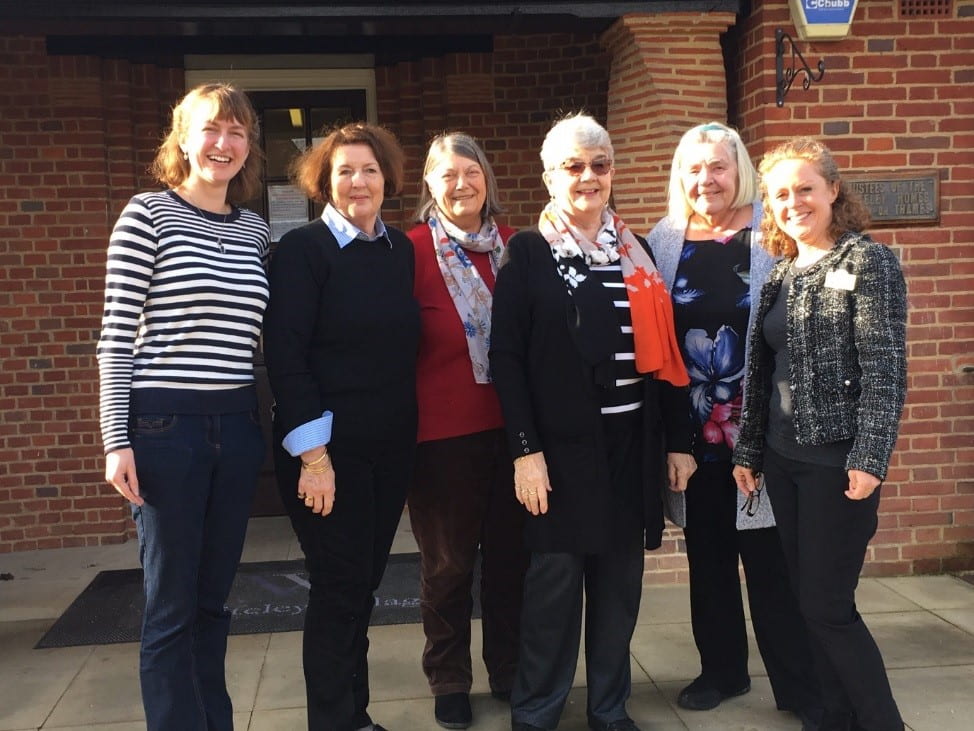“You, me and the Big D”: Changing attitudes to dementia in Whiteley Village through participatory research
By rmjlmcd, on 18 September 2019
In this post, Rachael Frost talks about her experience of conducting a participatory research project.
Whiteley Village is a retirement community in Surrey for people on low incomes. Dating back to 1917, the village provides housing, support and facilities for nearly 500 older people. Managed by the Whiteley Homes Trust, the village can support those with care needs in assisted living or a care home, but there are no dedicated dementia facilities. Despite this, a number of residents are living there with varying degrees of dementia. Although the village has a strong sense of community and residents can be very supportive towards each other, there is a sense that dementia is still stigmatised like cancer used to be (the old “Big C”) and that as a result, residents don’t receive the support they could from each other.
Enter Pauline, Mary, Peggy and Sue – four village residents who wanted to change this. In partnership with Dr Alison Armstrong from the Whiteley Foundation for Ageing Well and myself, we successfully applied for a British Society of Gerontology Averil Osborn Award for Participatory Research at the end of 2018.
The “You, Me and the Big D” project was a small research project designed to see whether Alzheimer’s Society Dementia Awareness Training would have a positive impact upon residents’ attitudes and behaviours to people in the village with dementia. Mary, Peggy, Pauline and Sue collected qualitative and questionnaire data from eight participants before and after the training, with qualitative research training and input throughout from Alison and myself.
So did anything change? Before the training, our participants told us that although they knew how to best support someone with dementia, they had plenty of examples from the village where this hadn’t happened. They felt this was due to lack of knowledge, village life (which could be supportive but judgmental), fear and the fact that different people with dementia had very different symptoms. Participants felt there was a need for more village support and wanted more information, particularly about dealing with aggressive behaviour.
“One day they might seem perfectly normal to you and the next day they’re not” (Barbara)
After the training, our eight participants felt like they had learnt quite a lot about different types of dementia and its other effects (such as on the senses and on balance), but wished to know a lot more than could be covered in three hours. For a couple of participants, it increased the worry about potentially aggressive behaviour from people with dementia. Some participants also reported issues with the training facilitation in that they would have liked to hear more from the speaker than others in the room.
“I’ve learned that there are different types of dementia which I hadn’t really considered and … people who have dementia are at different stages” (Camilla)
It was a great project to be involved in, although there were some challenges along the way! There was very little time to actually do the project (we received confirmation of the funding in January and had to present results at the British Society of Gerontology conference in July), particularly for training in qualitative interviewing and analysis, and very little budget. Some of the villagers weren’t receptive to the idea of other villagers doing research – with people saying “who do you think you are?” According to the village researchers, confidentiality was also a challenge in such a closed environment, as was having audio-recorders that were not very older person-friendly!
However, the benefits definitely outweighed these. Alison and I had a great time as the village researchers were so enthusiastic. Peggy, Mary, Sue and Pauline looked forward to our meetings and discussions, enjoyed learning and making a difference to the village and said they felt younger as a result. Mary and Sue came along to British Society of Gerontology 2019 conference and co-presented the project with Alison.
Of course, this was only a very small project. However, the main positive benefit from the Big D has been its wider impact on the village. Whiteley residents have been encouraged to talk about dementia more and dementia care has moved up the agenda with management. One person with dementia has even been able to move back into the village and live back with their spouse with better support. Further projects are being planned to improve dementia support in the village, so watch this space…
 Close
Close




